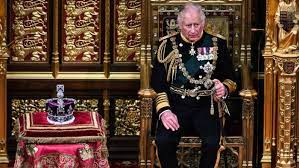Friday
“The king is dead. Long live the king.” I remember first encountering that apparent paradox when reading Mark Twain’s The Prince and the Pauper as a child. Combined, the two declarations emphasize both ending and continuity. Tom in this passage is the pauper who has been mistaken for the king:
“The King is dead!”
The great assemblage bent their heads upon their breasts with one accord; remained so, in profound silence, a few moments; then all sank upon their knees in a body, stretched out their hands toward Tom, and a mighty shout burst forth that seemed to shake the building—
“Long live the King!”
The paradox doesn’t work when the monarch is a queen, however. Nor, for all the coverage that Queen Elizabeth II’s death is getting, is there as much at stake as there was in days of old. When British monarchs wielded real power, transitions often raised extravagant hopes and overblown fears.
In recent years I’ve found myself thinking more about Queen Elizabeth than I normally would, largely because she interested my late mother, the two having been born less than a year apart. (Both died at 96.) We watched The Crown together, along with other programs featuring British royalty. My mother admired Elizabeth’s class and her propriety, qualities that she possessed as well.
So now we are set to have the first Charles since the 17th century. To celebrate the ascension of Charles III, I share two noteworthy poems about the previous two. Charles I was beheaded following the Puritan revolution, an event that is mentioned in Andrew Marvell’s “An Horatian Ode upon Cromwell’s Return from Ireland.”
Marvell is somewhat ambivalent about Charles’s execution since he sees Cromwell as the better man. The poem praises Cromwell’s successful campaign against the Irish (Marvell doesn’t mention its brutality). Charles, he suggests, could not have been so successful. Perhaps tradition has been broken but “Nature”—which is to say, natural talent, natural law—must win out.
Come to think of it, this is the way some Trump fanatics defend their leader’s violation of precedent, law, and democracy itself. When force is changing history, the old rules seem expendable–or empty, as Marvell puts it:
Nature that hateth emptiness
Allows of penetration less,
And therefore must make room
Where greater spirits come.
As the greater of the two men, Cromwell successfully lured Charles to Carisbrooke Castle, where he captured him and bore him off to “the tragic scaffold.” The execution was necessary, Marvell suggests: “This was that memorable hour/Which first assur’d the forced [Parliamentary] pow’r.” But he goes on to add that Charles at least died with class:
That thence the royal actor borne
The tragic scaffold might adorn,
While round the armed bands
Did clap their bloody hands.
He nothing common did or mean
Upon that memorable scene,
But with his keener eye
The axe’s edge did try;
Nor call’d the gods with vulgar spite
To vindicate his helpless right,
But bowed his comely head
Down as upon a bed.
Having given Charles some credit, however, Marvell then returns to praising Cromwell again. He, not Charles, is what Britain needs at this moment:
And yet in that the state
Foresaw its happy fate.
And now the Irish are asham’d
To see themselves in one year tam’d;
So much one man can do
That does both act and know.
They can affirm his praises best,
And have, though overcome, confest
How good he is, how just,
And fit for highest trust;
Nor yet grown stiffer with command,
But still in the republic’s hand;
How fit he is to sway…
The second Charles comes off even worse, at least in the verse of John Wilmot, who had a love/hate affair with the king while serving essentially as court jester. One poem he wrote about Charles–“A Satyr on Charles II”–got him banished from court for a while. You just have to glance at the first stanza to figure out why. Wilmot contrasts Charles with the “French fool” Louis XIV, with one being too warlike and the other too easygoing:
In th’ isle of Britain, long since famous grown
For breeding the best cunts in Christendom,
There reigns, and oh! long may he reign and thrive,
The easiest King and best-bred man alive.
Him no ambition moves to get renown
Like the French fool, that wanders up and down
Starving his people, hazarding his crown.
Peace is his aim, his gentleness is such,
And love he loves, for he loves fucking much.
The poem concludes by referring to Louis XIV as a hector (a bully) and Charles as a cully (an easy mark):
All monarchs I hate, and the thrones they sit on,
From the hector of France to the cully of Britain.
I prefer Wilmot’s other poem about Charles, however, because of its pithiness. Wilmot posted it on Charles’s bedroom door:
Here lies our sovereign lord the king,
Whose word no man relies on;
He never says a foolish thing,
Nor ever does a wise one.
In hindsight, the relaxed Charles II may have been a better king than Wilmot gives him credit for. His decision to go easy following his restoration to the monarchy may have been what the country needed following its civil war. Charles I, on the other hand, appears to have been rather inept. Marvell wasn’t wrong to associate him with “emptiness.”
Given how the monarchy has evolved, Charles III won’t have the opportunity to do great good or great harm. As a result, he is unlikely to trigger any memorable poems, either of praise or of condemnation.


